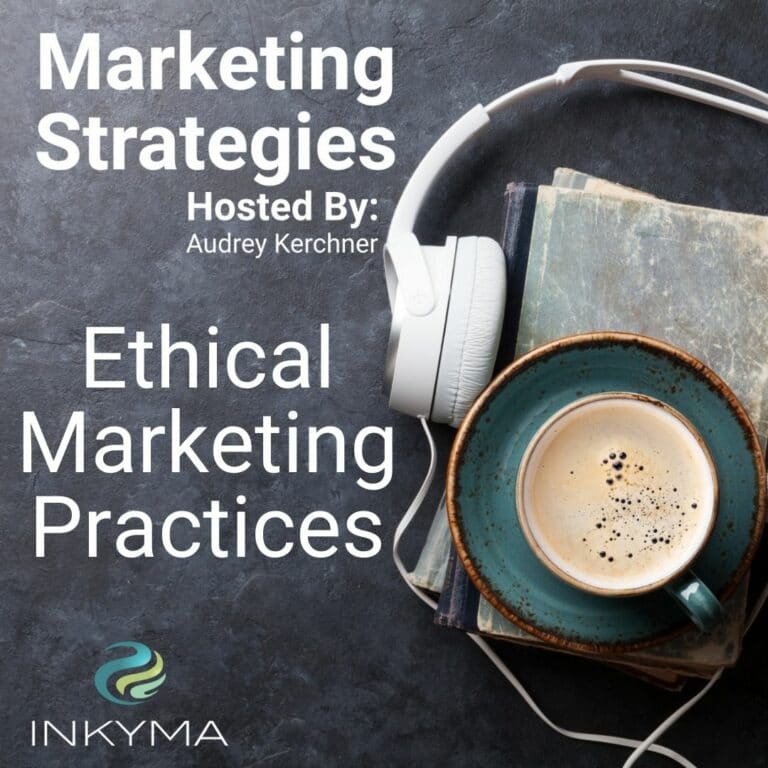Good marketing allows a business to grow through awareness and solid products and services that people want and need. Not all businesses want to go the long way by building a brand that is trusted by customers and cares about the product they produce. But many businesses do.
As a whole business owners want to market their business ethically but are unsure if they are. Understanding the gold rule of ethical marketing, which is to market to others as how you would like to be marketing too, can help keep a new business owner on the ethical track. Learn about
- The gold rule of ethical marketing
- Ethical marketing campaigns and how to use them
- Scrubbing a purchased email list
Episode 19 – Email Sales Funnels For Lead Generation
Episode 1 – Marketing Strategy vs. Tactics
Sign Up For Zero Bounce For Email Scrubbing
Sign Up For Mailchimp For Email Send And List Management
Sign Up For Constant Contact For Email
Link To Hatch Automated Outbound Messaging Services
Ethical Marketing Practices
*Not ready to give this episode a listen just yet? Below is a rough transcript of today’s episode.*
When I say marketing, what comes to mind? Some business owners
see it as the ticket to growing their business and others think of things
like manipulation could be ads, intrusive, popups, and videos on auto-
play with the volume turned all the way up, covering your content, being
in the market. Industry. I know we as marketers have a bad rap about
being deceitful and actually, for many of my competitors, it’s completely warranted. I’m
ashamed to be grouped in with them, but there is a way to ethically
market your business without feeling like you need to take a shower
after you launch your strategies and tactics or having to apologize to
friends and families, because someone was complaining about your
company.
And that’s what we’re going to talk about today. How to ethically market
your business for growth and leads. And most importantly, happy
customers.
So let’s do a little bit of housekeeping stuff first, before we dive into the
content, as always, there are lots of links that are going to be in the
show notes.
So if I talk about products or services that I mentioned our other episodes,
The links are going to be in the show notes. I might even put some extra
stuff that I don’t even remember to talk about into the show notes. So the
show notes have a lot of good stuff in it, including a rough transcript of
this episode.
So if there’s something you want to just go back and go over, partner
grammar, but we’re really just trying to make sure that the information is
there, the way that you need it to. So in this episode, and in many of our
episodes, I talk about product and services that we use that we
recommend.
And for many of those many, many of them, we are affiliate partners with
those companies. So those are our affiliate links that are listed in the
show notes. Please consider using our links. If you want to sign up for
those product or services, if they make sense for you. we do get a small
commission.
So think of it as a way of saying thanks For creating all this great free
content for you. now let’s talk about ethical marketing. I’m going to sum
this up and then go into detail. But first the golden rule of ethical
marketing market to others, as you would like to be marketed to.
All of us. Business owners. We’re consumers, too. We buy things. We
need services. we need to work with other companies. And so we don’t
like it when they do unethical things to try to get our business. So we
shouldn’t be doing that with our businesses. I. And so the way I like to
think about it is listen, I know I don’t like these things, so I’m not going to
do them.
So let’s pay it forward in a good way. Let’s show other companies
how,businesses should be marketed, how they should do things. and
surprisingly, I’m going to talk about like, you know, certain tactics aren’t
off limits. It’s really about how you use it. So let’s talk a little bit about
what not to do.
And then later in the show, I’m going to talk to you about the unethical
way certain tactics are used and the ethical way to use those tactics. I
mean, kind of go through the big major ones that are usually the
stumbling block for most businesses. Okay. So my first don’tdon’t treat
people like they’re stupid and don’t deliberately try to confuse them.
You’ll see a lot of website content out there. It’s got jargon and stuff in
there. And sometimes I think these companies legitimately are not trying
to confuse you. It’s just that they’re so deep in their head about the way
things work on their side, that they forget to bring it back up to more
simplistic level.
To talk to their customers. Those aren’t the people I’m talking to. They
do need to change their language, but it’s not that they’re doing it on
purpose. Now I’m talking to those in sales and marketing and owners
that, try to either be self-important or make their product or service or
business look more important by throwing industry jargon, have potential
customers to make their products feel better than they are.
And also to make them feel like they don’t understand how the industry
works so that they have to rely on the person in front of them to tell them
the right things to do right in this day and age of Google, we, as
consumers can research anything, get great information and have at
least a cursory level knowledge about any product service or industry
that we choose to.
So we don’t need businesses treating us like we’re. Or deliberately trying
to confuse us to get us, to trust them. This tactic, right? This tactic of
confusing and diverting doesn’t work anymore. What happens is when
you do something like that, people actually back away from confusion.
because we can research and find simpler things and there’s nine
people pretty much doing the same thing that each business does is we
can go.
No. No, no, you’re confusing me. This is gonna take me too long to
figure out with you. I’m going to go find something simpler. That’s how
our mindsets work these days. So when you create confusion people,
back away, which creates a longer sales cycle, which nobody wants.
And they actually, if they do wind up buying, they wind up buying.
Okay. I kind of want this. I’m not sure about the company. Let me buy
something last. Let me buy the base model to see if it’s what I want. So
moral of the story is don’t overcomplicate things and don’t try to confuse
people, keep things simple. It makes you more reliable, trustworthy, and
you get bigger sales that close faster because of that.
Okay. My second don’tdon’t take advantage of ignorance. And or age.
So ignorance really just means, they don’t know they haven’t done their
research. And it could very well be because they weren’t shopping for it.
And then age is a big one. We hear about it all the time. People taking
advantage of the young and of course the,much older population, Kind
of actually going after. let me give you an example of this ignorance and
age manipulation, right? Trying to take advantage of that. my son
recently had to buy a new car and, he got his first apartment. this all
happened when he turned 20, it all happened in the span of two to three
weeks.
And What we did was we said, okay, you need to get your insurance
policy separate from ours, and you’re going to need renter’s insurance.
So call our insurance agent, which at the time I trusted and get them to
set you up. I was hoping that they were going to take care of him. So
when he contacted them, yes, they pulled his policy over for the.
And then they did give him renter’s insurance, but at the exact same
time, they talked him into and manipulated his ignorance to get him to
buy life insurance. He doesn’t need life insurance. He doesn’t own
anything. And the tactic that they use, they said, if you don’t do it now,
when you’re 19, it’s going to be too expensive.
Or you may not be able to get it in the future, which is completely untrue.
He won’t be costed out of the market. he was given bad advice and he
was pressured into it. So he came home, not only with. car insurance
policy, a renter’s insurance policy. He came with life, which really upset
me and his father.
And so we told him, go back, get it canceled. They’re actually putting him
through this. Run-around about getting it canceled, but we’re going to
get that taken care of. And the short-sightedness of this example is that
yeah. They may have gotten that policy. They may have gotten away
with it with somebody else, but for us, they’re losing the policy.
They’re gonna lose all of our policies in the future because as soon as I
can get away, I’m going to, and I am not going to refer them. And I am
part of a lot of networking groups as a business owner, as a marketer. I
know the value of network marketing. And so everybody that I know and
trust is going to hear my story because what I don’t know.
To happen to them or their family is what happened to mine. And that’s
when I’m talking about paying it forward. When I have a great company,
I scream from the rooftops for everybody to use them because I want
them to have a good experience and similar to companies that are not
so good. I make sure everybody avoids them as well.
Okay. My next joke don’t offer something that does not exist. Don’t do
any bait and switches, right? Car dealerships in the past and now the not
so great ones are notorious for this. And they have been doing it for
years. It used to be before the internet, they would put their best cars in
the newspapers.
With the prices and that kind of stuff. And you would go over to the
dealership and you go, I want that one and they’d go, oh, I’m sorry that
one already sold, well, you know what? That one never existed. Nobody
has ever gotten that car. And then in this day and age, when they put
their. Inventory online, they put it up and if someone’s over there within
the next five or 10 minutes, they can’t use the same, excuse.
And so now they’re saying, oh, that one’s not ready for sale. And then
what they do is once they’ve gotten you in, they proceed to try to sell you
something else. That is on the lot that. As good of an offer as what they
had put out there. This is a really, really bad practice. And because of
this, they’re all excited.
They’re going to go see this. They’ve dreamed of the potential and you
just pop their book. No, you can’t have it, but you can have this, their
mindset went from happy and joyful to, disappointed and slightly
frustrated and annoyed in a split second. And so think about it when
you’re annoyed and frustrated.
Are you ready to buy something else? No. You need some kind of like, a
mental cleanse pallet in there to kind of get you rejiggered and then they
are blaming the message. So you’re the person that told them you had
this year, the person that told them you don’t have this, why are they
going to want to buy it from you?
And that’s what you get back into that cycle of no trust, longer sales
cycle and probably going to either leave or if they buy something, it’s
going to be a lot less than what you anticipated. So for this, if you have
good products and services, you don’t have to cave to that pressure of
offering something that doesn’t exist, right?
With good products and services. All you need are really, really good
awareness campaigns and the people that want those things will
absolutely come. And if you give them what they’re looking for, they’re
going to leave happy. if you feel like the pressure is too much to offer
something that you don’t have asked yourself, why don’t I have it and do
I need to replace, update, change, or modify my existing product or
services so that I have something desirable enough to get people to
come in for exactly what they were looking for.
That’s the way you have to look at. And then my last one is don’t be
annoying, right? respect people’s decisions to not want to interact with
you. Don’t spam. Don’t reach out to people that have no clue of who you
are, what you do, and then expect them to want. What you have. And I’m
also talking about in this situation where you have potential leads that
they do reach out to you legitimately first, you get back to them and then
they ignore you or you have a conversation and they ignore you later.
It happens to all of us. We need to take that with some. And don’t call
them 10, 12 times thinking that one telephone call was an open door
policy, because you’re definitely going to lose that person where if you
do the normal two to three, follow-ups from your initial meet and they
ignore you, just let them go.
Sometimes they actually come back. I’ve had that where I’ve had a
meeting with someone and,We say, okay, let me think about it. I’ll get
back to you. I may do a up email going, Hey, I just want to let you know
we’re here and I hear nothing six months later, they’re like, I’m so sorry.
I’m ready now. Can we do this and things move forward.
But if I had annoyed the crap out of them, there is no way they would
have come back to me in six months. You got to give people space and
room. We are all busy stuff happened. So again, don’t think that by
constantly pressuring and staying in someone’s face that you’re actually
making it easier for you to get the sale.
You’re actually doing the actual.
You’re listening to income as marketing strategies. And we’re talking
about ethical marketing practices today, one way to ethically market your
business is using the right tools for the job. And so for many economies,
businesses that are getting ready to start using a product like Shopify is
really a great way to get all the features and tools that you need to run a
successful e-commerce store and to be compliant and to keep, your
merchant accounts safe.
so what I have for budding e-commerce folks out there is an offer. We
are Shopify. And so what I can offer for a new business is that,we can
create a free development environment for you that is free for as long as
you’re developing your site. Doesn’t matter if it takes two months or six
months.
If you go directly through Shopify, they give you 14 days. Okay. 14 days
is not long enough to get any e-commerce site up and running. So if you
want to talk about using our free development environment through our
partnership, schedule a time to talk to me. You can either go to the
website in kuma.com I N K Y M a.com.
or there’s a link in the show notes to our scheduler as well, schedule
consultation. Let’s talk about your e-commerce business and see if it’s a
good fit for our development environment. So hopefully you’ll take
advantage of that offer.
So now let’s talk about some examples of ethical versus non ethical
marketing tactics.
so it’s a general tactic and a lot of it is how. You use it or how you abuse
it if it’s actually really ethical or not. let’s start with phone calls. and I’m
going to, in all of these, I’m going to start with non ethical first and then
talk about how to ethically use them. So non-ethical for phone calls.
Telemarketing calls. no, just don’t know. Don’t use this. Do not tell a
market, right? No one likes it. there have been apps that have created
just to thwart it. We have the ability to block it on our cell phones now
because things have moved to cell phones. And so I think it’s very
unrealistic to think that something like this is actually going to work.
the other thing is now because of all of this, it’s extremely expensive.
You have to hire people to do the calls, or we would have to send the
robo recordings. And then most of these guys have to have banks of
telephone numbers, so that once you block the first one, they get
through with the second one or the third one, And the only people you’re
going to get from this is people that you’re going to dupe into using your
product or services every once in a while. Very rarely the right person’s
like, oh, I’m so glad I picked up that telemarketing call because I can
actually use that. Doesn’t happen. If you’re feeling the pressure of doing
something where you get these really large pools of numbers of people
to contact, I can tell a market, a hundred thousand people, and then
that’s going to funnel down into 500.
Realize that you’re better off spending your money on other strategies
and tactics like content marketing, like digital advertising, like search
engine optimization to put yourself out there and let people that really
want and need your services. Find you. if you do want to use phones
and phone calls, let’s talk about some ethical ways that you can use it as
a marketing tactic to close leads, right?
So maybe not generating leads so much, but to close them. And so let’s
say you’re getting leads coming in through contact forms, through digital
ads, you’re going and doing network marketing. you’re part of some
groups. This is where you can use phone calls to follow up with those
people. They’ve given you your telephone number.
They know who you are. they want you to call, and that’s really a great
way to do it. The other thing is you can use it with existing customers to
service reminders. We always get those calls and those being
automated is totally acceptable, too. as well as call saying, Hey, it’s time
to turn on, turn off your sprinklers.
It’s time for you to fertilize your trees again. you can use those types of
things and I’m going to talk more about it. Tool later, where you can
actually automate a lot of this. So you don’t actually have to pay
someone to pick up the phone and do all the things, but again, do this
sparingly don’t just because someone gave you their contact
information, don’t call them 10 times.
Right.
So let’s move on to our next tactic Email’s a big one. If you’ve listened to
any of the other podcasts, you know, I love content marketing. I love
email marketing. I think it is really something that everybody needs as
part of their marketing tactic system. So unethically using mark. Buying
lists of consumers that are unqualified, and then you just send them
spam emails every day. not knowing if they want or need your product, if
the email is valid or not. and then not having any type of opt-out
mechanism for them so that they have to report you as spam. Have you
blocked and then your URL gets blacklisted and then you start going
through.
The whole URL process of different email addresses because the first
one’s blacklisted and the second one isn’t, and by the way, the reason
you get blacklisted is because not having an unsubscribed process is
actually against the law. There is a canned spam law out there that says
you have to.
Allow people to unsubscribe from you. Listen, you have to have
mechanism and it has to work, right? Ignorance of, oh, it’s broken,
doesn’t work, right? Not that they’re going to come after you, but it allows
other, listing services like Google and that kind of stuff to blacklist you
and then stop your emails.
from coming through. And then another unethical use of. Is spamming
other businesses by pushing your spam through their contact form on
their website. this is just really, a bad way to try to reach out to a new
business because their mindset is in a totally different place. When they
see a contact form from their website, come through.
If they’ve gone through the trouble of creating that contact form and
putting it in all the right places. And that form comes through. They’re
expecting a lead they’re expecting business. They’re not expecting to be
solicited. And so when you solicit to them, they’re gonna be like, wait,
what? It’s a disconnect.
And then the trust is broken and then they push away because it’s
confusing because it’s not what they expected. So you’re actually much
better off trying to find a different way to get in front of that person. Other
than that, Putting your information in their contact form. Trust me, I’ve
had so many conversations with clients about, why am I getting this
through my contact form?
How do we stop the spam? I probably had more of those conversations
than I have, about anything else. And it’s still not something that we can
solve. So let’s talk about ethical email. mark. So ask potential customers
to sign up for your email communications, ask them to opt in. You can
do that on your website.
You can do that. If you meet them in person say, Hey, I want to add you
to my newsletter. I think our content would be really good for you. Sure.
I’d love it. If you go to trade shows, remember that big fish bowl of
business cards that you collect, If they’re going to put in for a drawing,
make sure they understand you’re going to be put in for drawing.
And we’re going to sign you up for our email newsletter. They may still
unsubscribe at some point, but it’s completely different than you just
spamming them.
And then this way you have the ability to have that warm connection turn
into an even warmer connection. So make sure you’re using an email
system like MailChimp or constant contact to send emails. They
automatically have unsubscribe in place. Their whole systems are set up
to make sure that you are legally compliant with all the email and GDRP
and, local laws, pertaining to either.
They help you stay compliant, which I think is great. And then if
someone does opt out, they manage that on your behalf automatically.
That’s part of the service. So all of your unsubscribes never get
resubscribed, and all that other good stuff. So I highly recommend that
you use a system like that.
There are links in the show notes to both MailChimp and constant
contact. Those are the two that we’re partnered with and that we really.
The other ethical thing I want to talk about is list buying. I think it’s okay
to buy lists, but with caveats around it certainly B2B lists and then some
consumer lists, right?
Make sure you’re buying from a reputable source and also make sure
that they’re highly targeted. This is the difference. I’m not saying go out
and buy a list of a hundred thousand email addresses of people around
the United States. And there’s no qualifiers around it. That is useless.
What I’m saying is, let me give you an example.
So for Beto. Let’s say that your service or product works really, really
well for real estate agents. And you want to target specifically real estate
agents in the state of Utah, you can buy a list of licensed real estate
agents in Utah. Let’s say you only want to do one county in Utah. Let’s
say you’re a local business in Utah, and you only want real estate agents
in your county.
You can buy that list and then emailing them. Doing a sales funnel or
doing an introductory email saying, Hey, we’re a service business in your
area and offer them something free. Don’t ask them to buy anything, but
just say, Hey, we’d love to connect. I have this free thing I’d love to give
to you.
How about let’s get a cup of coffee. You’re not asking them for anything.
All you’re doing is you’re trying to connect with them. So that’s the way I
recommend to do it. The other thing is, is with consumers. You have to
see if there is something out there that is, a group of like-minded
consumers or in a specific category.
I’m talking about people that are coffee lovers, people that do CrossFit,
people that run marathons. If you can get a list of someone that is in
your target audience down to that and hopefully even in a geographic
Location. Oh, then that is worth buying. Now, let me give you a tip about
buying.
When you buy the list. I really, really strongly, strongly suggest that you
scrub it before you upload it to your CRM. Here’s why the list may not be
pristine. There may be a lot of crap in it. I’ve gotten good lists. I’ve
purchased bad lists. All of them get scored. So that you’re only
uploading good valid email addresses, because if you try to upload the
crap to your CRM system, along with the good they’re going to flag you
and then make you, re authenticate everybody, which is a pain.
So the product that we actually use for all of our lists that we do with all
of our clients is a product called zero bounce. And you upload your list,
they scrub it and they actually give you separate, CSV files that you can
then upload to your system. There’s a link in the show notes to zero
bounce as well, and you’ll only pay for what you’re using.
So it’s not like a monthly subscription, which I think is really cool. Okay.
Next tactic, text messaging. This is the kind of a new kid on the block.
Not really, but we can use it now. Because most people have unlimited
text messaging and I’m fortunately on the unethical side, the same thing
happens is where we’re now getting all this text spam, which is really
annoying.
and that nobody ever trusts or anything. Cause you don’t know where it’s
coming from. These links come through. It’s just bad. So no weird
spammy, messages with links.
So let’s talk about the ethical side of texting, right? this is where you can
do really cool things like appointment reminders, event notifications
follows up to conversations, to engage people that have wanted to
engage with you first. So they may have filled out a contact form and on
that form, you asked for their cell number.
and then you could do it manually. Or there are systems out there like
hatch, where they will automate the process of phone calls, text
messages, and emails. I like this as a companion product to your normal
CRM system, like your MailChimp or your constant contact. because if
they do reach out, you can send them a text message saying, Hey.
Amber from so-and-so company, we got your message. So glad you
reached out. And then depending on what they chose, maybe you had
four or five things you can say. We’d love to schedule a time to talk to
you about what you chose. let us know when a good time to reach out to
you is, and then they’ll respond back.
if they’re one of those, looky-loos where they filled it out and they ignore
you. Great, no skin off your back. You didn’t spend any personal time.
Hatch took care of it for you. You can do the same thing within a phone
call. All right, returning that or getting an email sent, or you can have all
3 cents, right?
Because sometimes people, you don’t know what their contact
preferences, they may be phone people, text people or email people,
where you get the fastest response. But again, do this sparingly have
one to two followups and leave it at. And then the last one I’m going to
talk to you about is offers, right?
Giving people offers. This is usually where a lot of companies will fall
down, unethical offers, right? Putting something in an ad that doesn’t
exist. And then when that person calls or shows up, you sell them
something else. I was talking about that before. this is where that
applies. Don’t try to sell them something that they don’t need.
You can always offer something, don’t pressure them, it’s not going to be
in your best interest or their best interest. So let’s talk about ethical
offers. That’s why I included this here again, because sometimes I think
what we consider an ethical offer, some people get a little squirrely
about, and it’s really using.
To suggest what and how they should buy and then a promotion to
incentivize them or to create urgency. So limited time offers, It just
means that, the offer is good and it’s valid and you’re prepared to honor
it, but only for a small. The caution with this one is if you set it for a
month, don’t run the exact same thing again the next month, because ,
the sense of urgency is lost.
And a little bit of the trust is broken. They’re like they’re offering this all
the time. They’re just saying it’s a month, It starts to break the trust.
exclusive offers for members. These are great, sign up for our newsletter
and get offers that only apply to our newsletter members. Or to our
customers or something like that, just make sure that is the only place
you have it again, don’t break that trust and the same thing with,free
shipping over $75, buy one, get one free.
when you’re doing all of those, if you’re doing e-commerce or , if it’s
mostly automated with like coupon codes, test the system and make
sure it works, because if it’s broken that breaks trust and they think
you’re spammy, they think you’re schemey when in reality, your system
just broke, right?
You can be highly, highly ethical and you can have a bug in your
system. But they’re not going to give you that benefit of the doubt. If
they’re a brand new car. All right. So now we’re going to talk about taking
action with this knowledge and taking action today. it’s pretty simple. It’s
a simple one.
so after you’ve listened to this, I hope you’ve said to yourself, I don’t do
those things. Great. You are covered. You’re good to go. You can feel
confident in your work. but if you do know a business owner, that’s kinda
living in that gray area a little bit, or definitely on the dark side of
marketing, please forward this to them.
That would be your action step, right? Let’s get us all up to the same
standard of ethical marketing. And if you are in that gray area, Or you’re
considering stepping over to the dark side, my guess is that it’s because
of pressure, right? Business pressure to sell more faster, right? Oh, I got
to sell, I’ve got to grow my business.
I’ve got to do whatever it takes in reality. You’re shooting yourself in the
foot. If someone’s given you that advice to do these types of things,
they’re wrong, right? You are going to be much, much better off in the
long run. ethically marketing your business, having really good product
and services.
A lot of businesses grow and thrive this way. Just remember marketing
takes time. and these unethical practices are really not get rich, quick
schemes. They’re like, let us take your money and really upset the crap
out of people. And you go out of business really fast type of schemes.
So use ethical marketing to get more customers and happier customers
that are going to refer you again and again, and help you get more
business.
Here at Inkyma we like to give back to the business community. I
provide a free 45 minute consultation to any business owner.
Regardless if you’re looking for ethical marketing tactics, maybe you
want to talk about I’m doing this. Is it really ethical enough? it might be
just a tweak, a language here or there that brings up the trust factor or
using different colors.
Who knows? But we can talk about that. Maybe you want to talk about
search engine optimization or your website. Whatever you want to talk
about those 45 minutes are yours. Just go to the website in kamau.com I
N K Y M a.com. And there is a schedule marketing valuation button in
the right hand corner.
Pick your date and time, and we are on the calendar. if you just have a
question or if you have a topic suggestion, I love getting articles,
suggestions from the community. fill out the contact form, put everything
in there. I respond back to it. And if you do suggest it, I’m going to give
you a big shout out.
Suggesting us to research and educate you on something that you want
to know about. So hopefully you found this episode confirming,
educational and enlightening. Please share it. If you know someone who
needs it. our goal is to help the entire business community, grow and
thrive. Thanks for listening and have an amazing day.



























